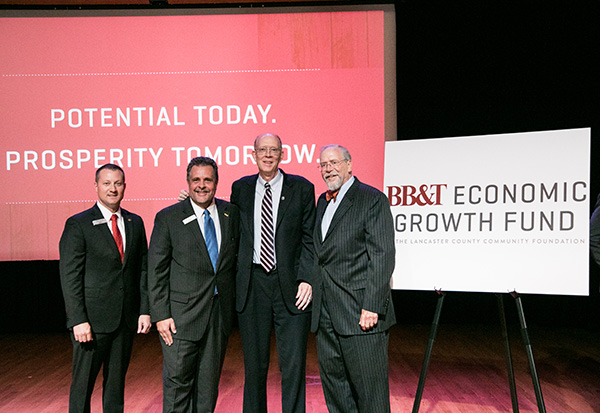
Thanks to part of a $350,000 BB&T Economic Growth Fund grant and coordination among Elizabethtown College’s High Center for Family Business, the Social Enterprise Institute (SEI), Elizabethtown Area Chamber of Commerce, Elizabethtown Public Library and several social enterprise partners, there is a promise to promote economic and academic growth in the Elizabethtown area.
“Destination E-town: Creating Jobs and Sustaining Businesses in Lancaster County,” the title of the grant for this multi-faceted partnership, will fund small business development, social enterprises initiatives, investment and training, project research, computers, business furnishing and supplies to improve the standard of living and economic health of Lancaster County. The related projects will strengthen student research and experiential learning.
The grant announcement was made Thursday, Sept. 21, at the Ware Center in downtown Lancaster. Lancaster Mayor Rick Gray introduced the program to the more than 200 community and business leaders in attendance. Elizabethtown College shares the 2017 BB&T Economic Growth Fund of the Lancaster County Community Foundation with Southeast Lancaster Health.
In November 2015 BB&T committed to $10 million to establish the Economic Growth Fund—the largest private sector gift to economic development and workforce projects ever made in Lancaster County. Over a two-year period, the Fund has granted more than $6.1 million to 11 Lancaster-based, non-profit organizations with programs focused on creating sustainable and thriving jobs.
“Destination E-town” will serve as an umbrella under which resources will be brought together to strengthen the economy through business incubation and the creation of jobs. In response to the grant, the Elizabethtown partners will create internships and research jobs for E-town College students to strengthen partner businesses, which will, in turn, grow and create jobs for the people of Elizabethtown and the greater Lancaster County.
The High Center’s agreement provides support and seeks donations and investors for business development and research work undertaken by students. It also will continue peer groups if demand is strong, allow access to High Center talks by all partner businesses and continue to partially underwrite membership for struggling family businesses.
The College’s SEI will assist the following new and growing social enterprises:
- Treasures Markets (working to bring fresh food, groceries, and clothing to underserved areas)
- Commercial Driver LifeNet (addresses the persistent health needs of truck drivers, which, as a group, have one of the poorest health conditions of any working population)
- Hera Brand Inc. (working to eradicate infant and maternal mortality worldwide and revolutionize mobile healthcare service delivery)
- AHF-Nepali Spice Company (engaging Nepali refugees in Lancaster and Nepal to grow and sell specialty Nepali spices for Nepali/Indian restaurants and stores)
- Coffee for Peace (involving the SEI and the Library, this is a collaboration between Coffee For Peace in the Philippines and the Elizabethtown Coffee Company)
- the About Child Trauma Foundation (international expert in child trauma and attachment, ACT provides training and offers services that help traumatized children heal from community violence and encourage attachment).
Besides the creation of jobs in Lancaster County, one of the BB&T grant’s primary goals is to “strengthen research and project-based experiential learning opportunities for students in addition to strengthening the economy of Elizabethtown and Lancaster County,” said Lesley Finney, Elizabethtown College’s executive director of foundation and government relations, in a grant statement. Finney, College President Carl J. Strikwerda and David C. Beidleman, vice president for institutional advancement and community relations coordinated the efforts to obtain the grant.
Jim Reeb, director of the Social Enterprise Institute, and Rick Basom, executive director of sponsored research will be instrumental in the execution of the grant proposals. “It’s not so much what we do- it’s why we do it that matters. These funds will help us significantly as we move towards meeting our goal of impacting 10 million lives by 2025,” said Reeb.

